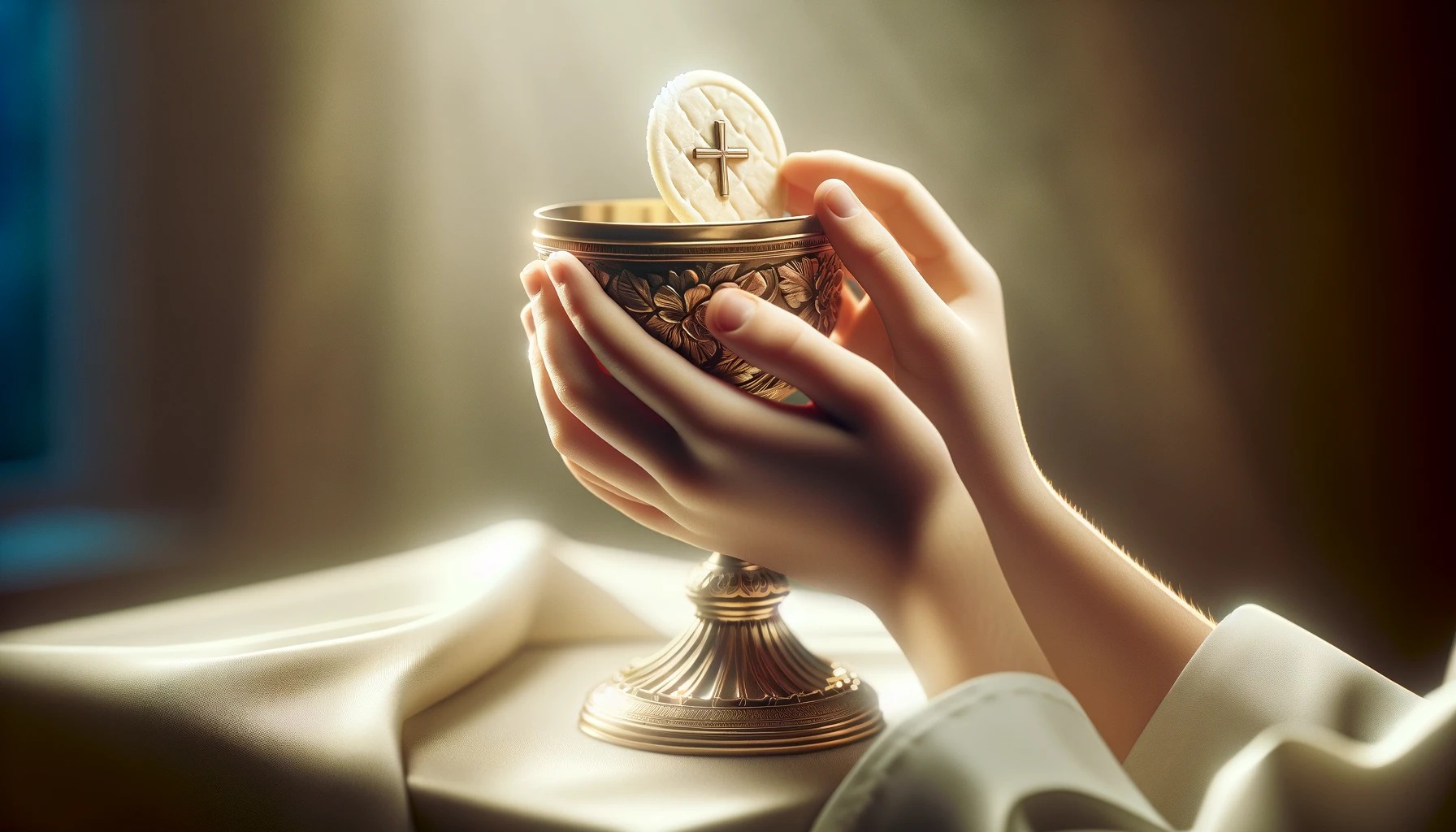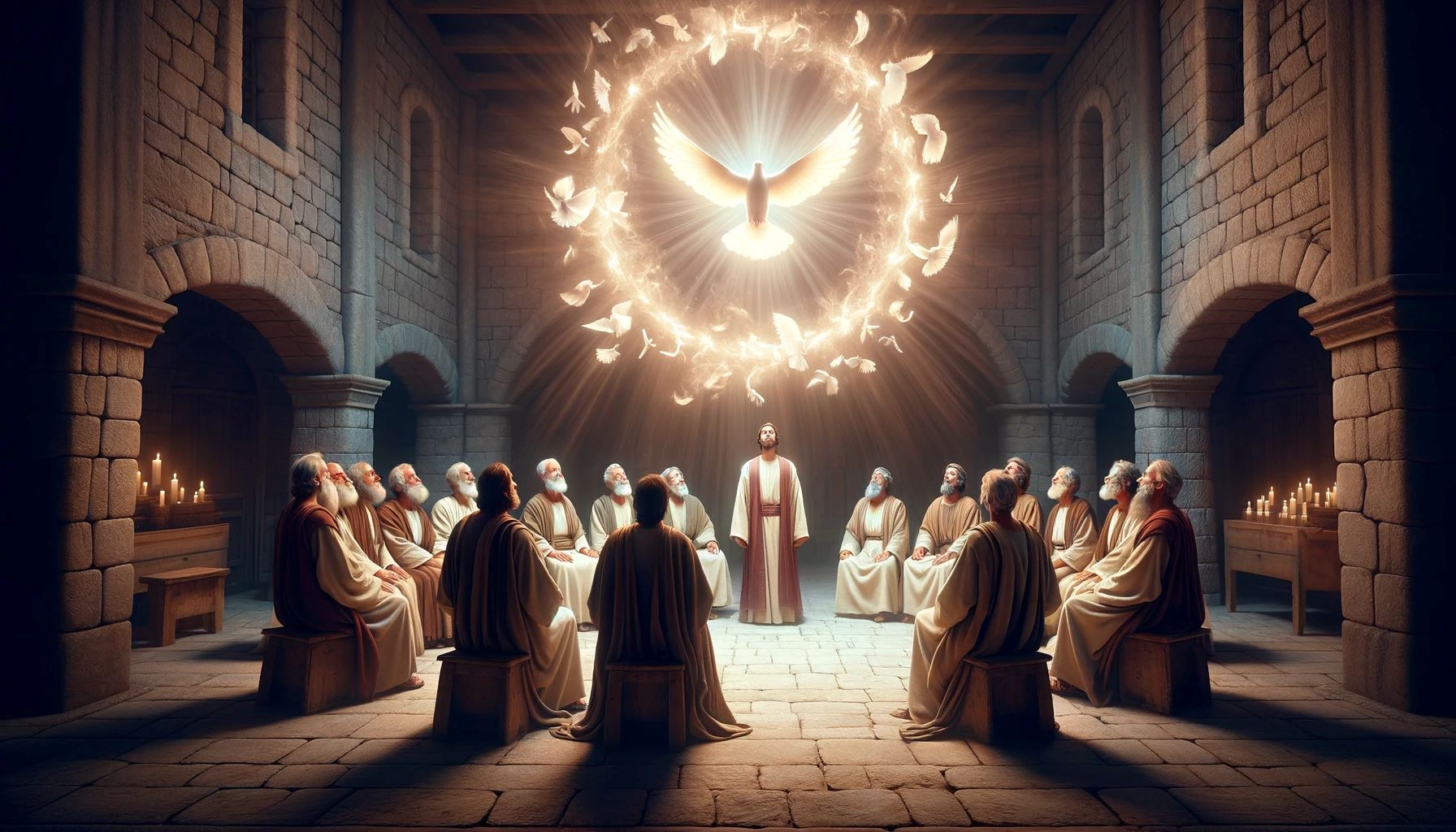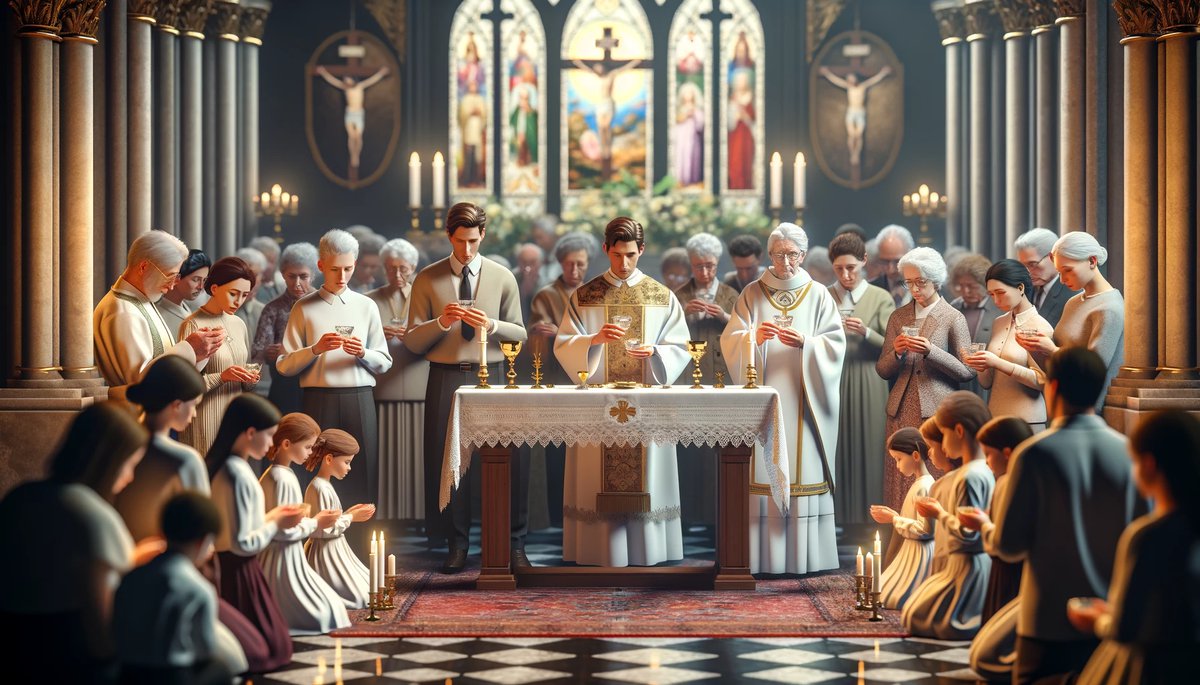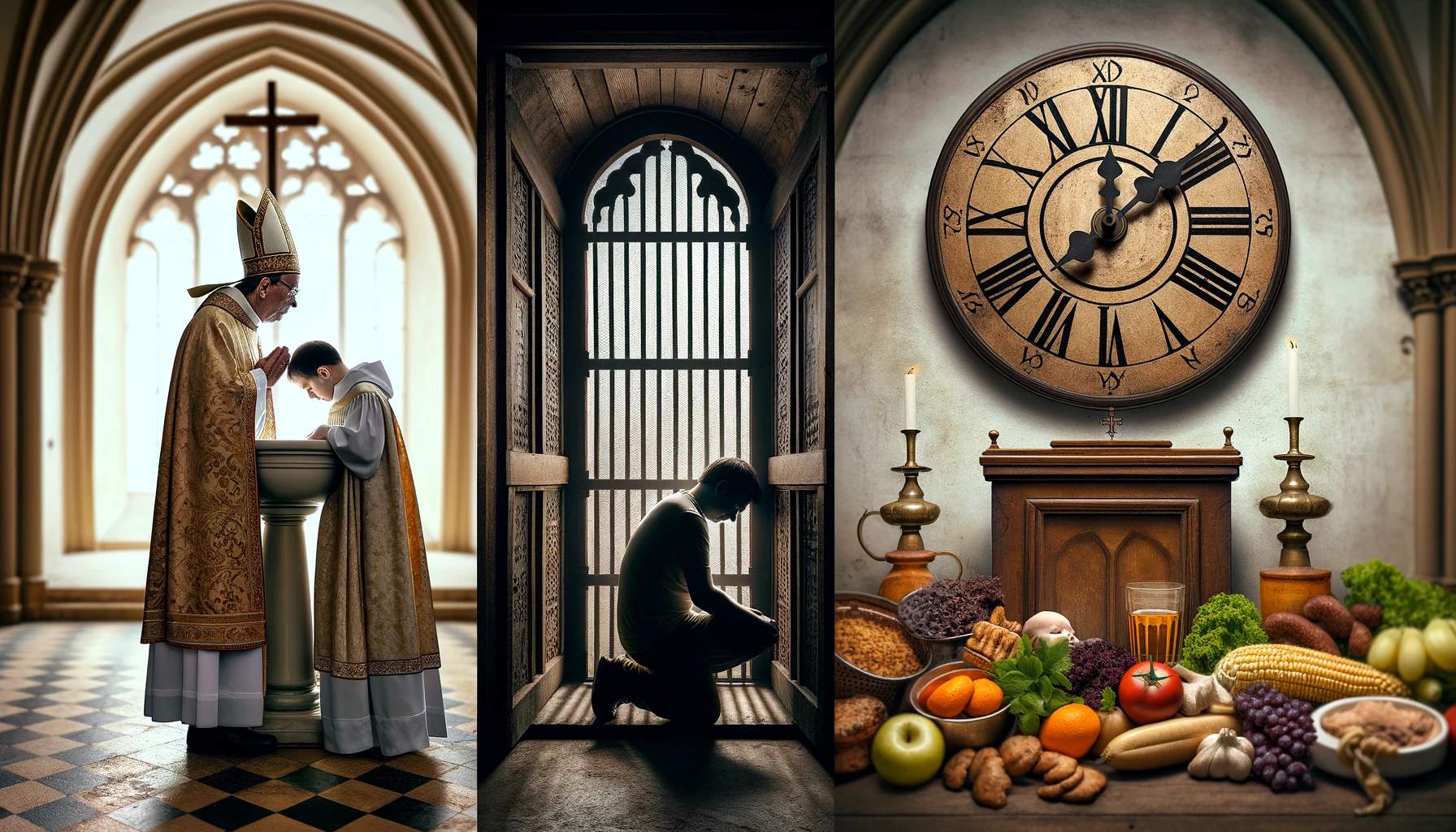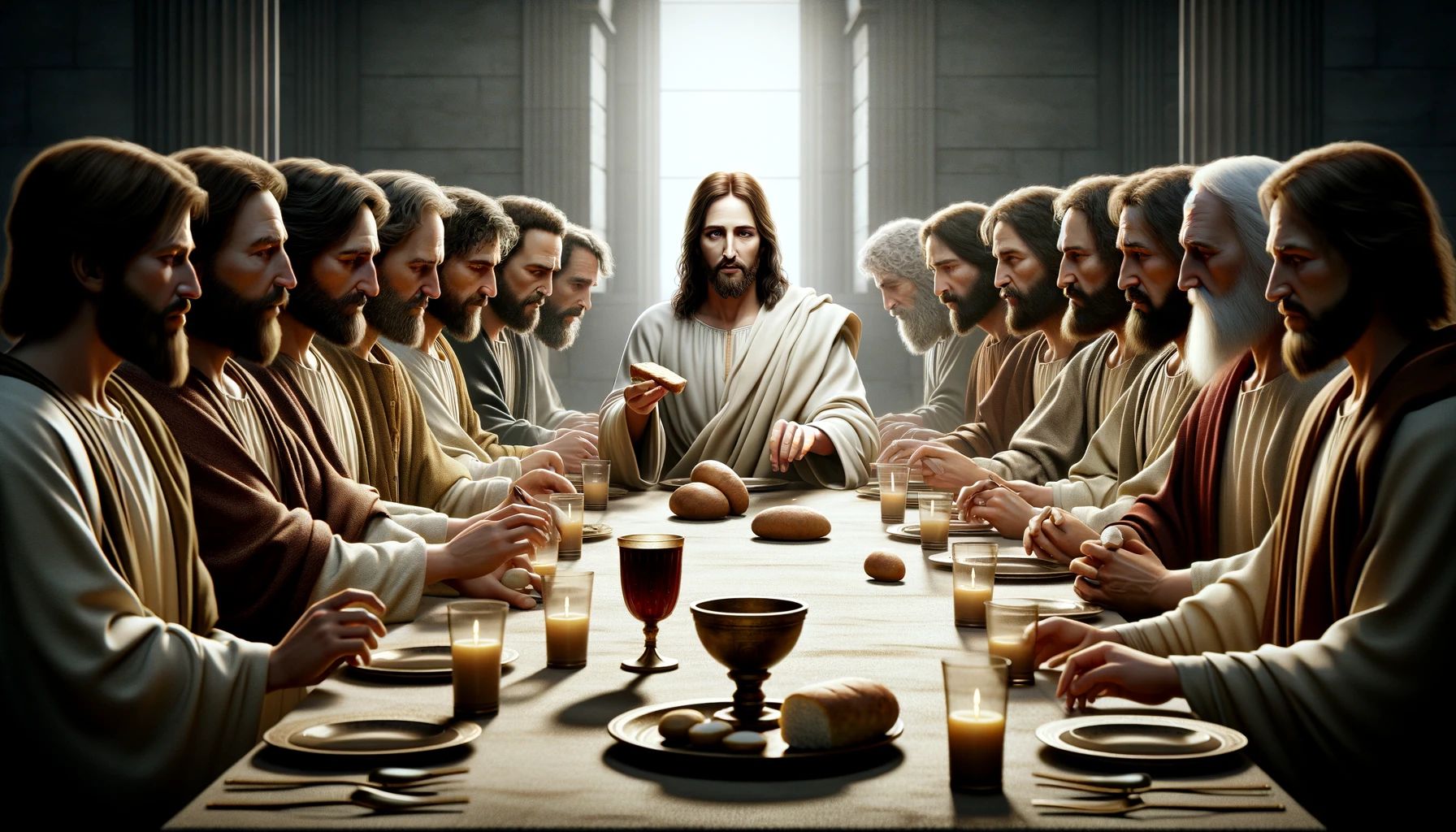Home>Theology and Spirituality>What Happens In Holy Communion
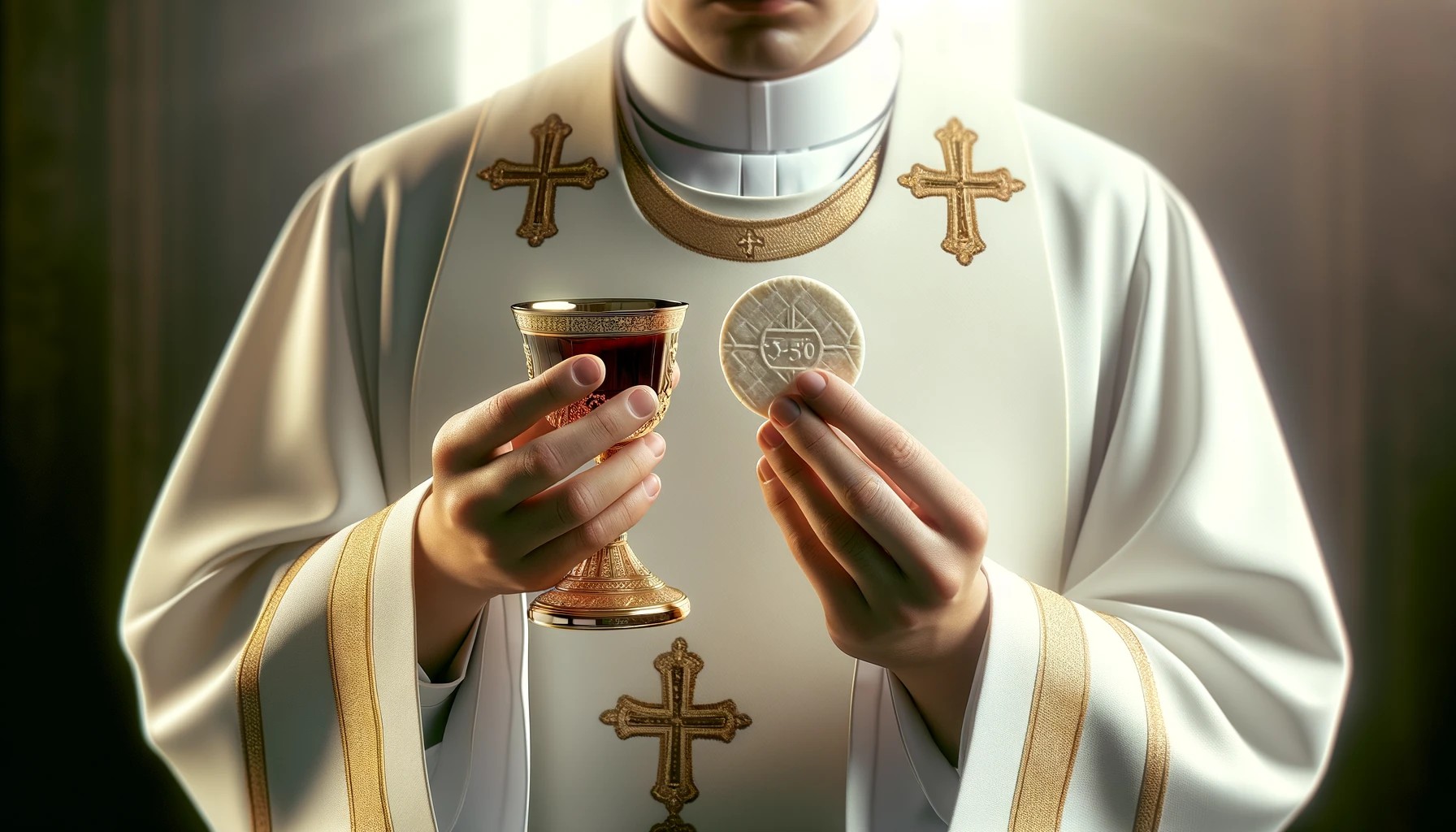

Theology and Spirituality
What Happens In Holy Communion
Published: February 25, 2024
Peter Smith, Editorial Director at Christian.net, combines deep insights into faith, politics, and culture to lead content creation that resonates widely. Awarded for his contributions to religious discourse, he previously headed a major organization for religious communicators, enhancing dialogue on faith's societal impacts.
Discover the significance and spiritual impact of Holy Communion in theology and spirituality. Explore the deeper meaning behind this sacred practice.
(Many of the links in this article redirect to a specific reviewed product. Your purchase of these products through affiliate links helps to generate commission for Christian.net, at no extra cost. Learn more)
Table of Contents
Introduction
Holy Communion, also known as the Eucharist or the Lord's Supper, holds a central place in the Christian faith. It is a sacred ritual that symbolizes the core beliefs of Christianity and serves as a profound spiritual practice for millions of believers worldwide. The act of partaking in Holy Communion is deeply rooted in the teachings of Jesus Christ and has been a cornerstone of Christian worship for centuries.
The significance of Holy Communion extends beyond its religious and historical context. It embodies the spiritual connection between individuals and their faith, fostering a sense of unity and reverence within the Christian community. As we delve into the multifaceted aspects of Holy Communion, we will uncover its profound meaning, historical evolution, and its enduring impact on the lives of believers.
The act of partaking in Holy Communion is a poignant reminder of the sacrificial love and redemptive grace exemplified by Jesus Christ. It is a tangible expression of faith, as participants engage in a symbolic reenactment of the Last Supper, where Jesus shared bread and wine with his disciples, instructing them to do the same in remembrance of him. This sacred observance serves as a spiritual nourishment, renewing the bond between individuals and their faith, and reinforcing the teachings of Christ in their hearts and minds.
As we embark on this exploration of Holy Communion, we will unravel its profound significance, tracing its origins, understanding its symbolic elements, and delving into its role within the diverse tapestry of Christian traditions. Through this journey, we will gain a deeper appreciation for the timeless relevance of Holy Communion and its enduring impact on the spiritual lives of believers across denominations and cultures.
Read more: What Happens In A Holy Communion
The Meaning of Holy Communion
At the heart of the Christian faith, Holy Communion embodies profound spiritual significance, encapsulating the core tenets of Christianity. It is a sacred ritual that symbolizes the sacrificial love, redemptive grace, and spiritual nourishment offered by Jesus Christ to his followers. At its essence, Holy Communion serves as a poignant reenactment of the Last Supper, where Jesus shared bread and wine with his disciples, imparting timeless teachings and imbuing the act with profound symbolism.
The bread and wine, central elements of Holy Communion, hold deep symbolic meaning within Christian theology. The bread represents the body of Christ, broken for the salvation of humanity, while the wine symbolizes his blood, shed as a testament to divine love and forgiveness. Through the act of partaking in the bread and wine, believers commemorate the selfless sacrifice of Jesus Christ, acknowledging the transformative power of his redemptive grace and the enduring legacy of his teachings.
Furthermore, Holy Communion fosters a sense of spiritual communion and unity among believers, transcending individual experiences to forge a collective bond within the Christian community. It serves as a tangible expression of faith, as participants come together to partake in the sacred elements, reaffirming their commitment to the teachings of Christ and the shared values of compassion, forgiveness, and love.
The act of receiving Holy Communion is imbued with reverence and introspection, inviting participants to reflect on their spiritual journey and reaffirm their connection to the divine. It serves as a source of spiritual nourishment, renewing the innermost convictions of believers and strengthening their resolve to embody the virtues exemplified by Jesus Christ.
In essence, the meaning of Holy Communion transcends the boundaries of time and space, encapsulating the enduring legacy of Christ's teachings and the profound impact of his redemptive sacrifice. It stands as a testament to the unifying power of faith, fostering a sense of spiritual communion and reverence that resonates deeply within the hearts and minds of believers across generations.
The History of Holy Communion
The history of Holy Communion traces its origins to the pivotal event of the Last Supper, a momentous occasion in the life of Jesus Christ that holds profound significance within Christian theology. According to the Gospels of Matthew, Mark, and Luke, the Last Supper took place during the Passover feast, as Jesus gathered with his disciples in an upper room in Jerusalem. It was during this sacred meal that Jesus instituted the ritual of Holy Communion, imparting timeless teachings and imbuing the act with profound symbolism.
During the Last Supper, Jesus took bread, blessed it, and broke it, sharing it with his disciples, and said, "Take, eat; this is my body." He then took the cup, gave thanks, and offered it to his disciples, saying, "Drink from it, all of you; for this is my blood of the covenant, which is poured out for many for the forgiveness of sins." These words, spoken by Jesus, established the foundational elements of Holy Communion, setting in motion a sacred tradition that would endure throughout the centuries.
Following the crucifixion and resurrection of Jesus Christ, the early Christian community embraced the practice of Holy Communion as a central component of their worship and spiritual observance. The Acts of the Apostles provides insights into the early gatherings of believers, where the breaking of bread and the sharing of the cup were integral to their communal worship and fellowship. The apostle Paul, in his first letter to the Corinthians, also expounded upon the significance of Holy Communion, emphasizing its role in commemorating the sacrificial love of Christ and fostering unity within the body of believers.
As Christianity spread across diverse regions and cultures, the practice of Holy Communion evolved within various denominational traditions, each imbuing the ritual with unique theological interpretations and liturgical expressions. The early church fathers, such as Ignatius of Antioch and Justin Martyr, offered profound insights into the significance of Holy Communion, underscoring its transformative power and spiritual nourishment for the faithful.
Throughout the centuries, Holy Communion has remained a cornerstone of Christian worship, transcending historical epochs and cultural shifts to retain its central place within the liturgical life of the church. The rich tapestry of history has witnessed diverse expressions of Holy Communion, from the solemnity of the Roman Catholic Mass to the simplicity of Protestant communion services, each preserving the sacred essence of the ritual while embracing distinct theological emphases.
In essence, the history of Holy Communion stands as a testament to the enduring legacy of the Last Supper and the profound impact of Jesus Christ's teachings on the spiritual life of believers. It serves as a timeless link to the foundational events of the Christian faith, embodying the unifying power of Christ's redemptive sacrifice and the enduring communion of believers across generations.
The Elements of Holy Communion
The elements of Holy Communion, namely the bread and wine, hold profound symbolic significance within Christian theology, encapsulating the core tenets of the faith and serving as tangible expressions of spiritual nourishment and unity.
The bread, representing the body of Christ, stands as a poignant symbol of his sacrificial love and redemptive grace. As participants partake in the bread, they commemorate the selfless sacrifice of Jesus Christ, acknowledging the transformative power of his redemptive grace and the enduring legacy of his teachings. The act of breaking the bread echoes the words of Jesus during the Last Supper, reinforcing the profound connection between believers and the redemptive sacrifice of Christ.
Similarly, the wine, symbolizing the blood of Christ, serves as a testament to his enduring covenant and the forgiveness of sins. As participants partake in the cup, they reaffirm their commitment to the teachings of Christ and the shared values of compassion, forgiveness, and love. The act of sharing the cup fosters a sense of spiritual communion and unity among believers, transcending individual experiences to forge a collective bond within the Christian community.
The act of receiving the elements of Holy Communion is imbued with reverence and introspection, inviting participants to reflect on their spiritual journey and reaffirm their connection to the divine. It serves as a source of spiritual nourishment, renewing the innermost convictions of believers and strengthening their resolve to embody the virtues exemplified by Jesus Christ.
In essence, the elements of Holy Communion encapsulate the profound symbolism of Christ's sacrificial love and redemptive grace, fostering a sense of spiritual communion and unity among believers. They stand as tangible expressions of faith, serving to renew the bond between individuals and their faith, and reinforcing the teachings of Christ in their hearts and minds. Through the sacred elements of bread and wine, Holy Communion embodies the enduring legacy of Christ's teachings and the unifying power of faith within the Christian community.
The Role of Holy Communion in the Christian Faith
Holy Communion plays a pivotal role in the Christian faith, serving as a profound sacrament that embodies the core beliefs and spiritual practices of believers. At its essence, Holy Communion serves as a tangible expression of the redemptive grace and sacrificial love exemplified by Jesus Christ, fostering a deep sense of spiritual communion, renewal, and unity within the Christian community.
Central to the role of Holy Communion is its significance as a sacred remembrance of the Last Supper, where Jesus Christ instituted the ritual, instructing his disciples to partake in the bread and wine in remembrance of him. This act of remembrance holds profound theological implications, as it serves to reaffirm the central tenets of the Christian faith, including the atoning sacrifice of Christ, the forgiveness of sins, and the enduring covenant between God and humanity.
Moreover, Holy Communion serves as a source of spiritual nourishment for believers, renewing their innermost convictions and strengthening their connection to the divine. As participants partake in the sacred elements, they are invited to reflect on their spiritual journey, seek forgiveness, and reaffirm their commitment to living out the teachings of Christ in their daily lives. This spiritual nourishment extends beyond the physical act of partaking in the bread and wine, permeating the hearts and minds of believers with a profound sense of grace and renewal.
Furthermore, Holy Communion fosters a sense of unity and communion within the Christian community, transcending individual experiences to forge a collective bond grounded in shared faith and reverence. The act of coming together to partake in Holy Communion underscores the interconnectedness of believers, emphasizing the communal aspect of the Christian faith and the shared journey of spiritual growth and transformation.
In essence, the role of Holy Communion in the Christian faith encompasses its function as a sacred remembrance, a source of spiritual nourishment, and a unifying force within the Christian community. It stands as a timeless practice that reaffirms the foundational teachings of Christ, fosters spiritual renewal, and cultivates a deep sense of communion and unity among believers across diverse denominations and cultural contexts. Holy Communion remains an enduring testament to the transformative power of faith and the unifying grace of Christ within the tapestry of Christian spirituality.
Read more: What Is Holy Communion?
The Practice of Holy Communion in Different Christian Denominations
The practice of Holy Communion, while rooted in the foundational event of the Last Supper, manifests diverse expressions and theological interpretations across various Christian denominations. Each denomination brings unique perspectives, liturgical traditions, and theological emphases to the observance of Holy Communion, enriching the tapestry of Christian spirituality with a rich diversity of practices and beliefs.
In the Roman Catholic Church, Holy Communion, known as the Eucharist, holds a central place within the liturgical life of the faith community. The Catholic understanding of the Eucharist emphasizes the doctrine of transubstantiation, wherein the bread and wine are believed to undergo a profound transformation, becoming the actual body and blood of Christ. This theological perspective underscores the sacramental nature of the Eucharist, highlighting its role as a tangible encounter with the divine presence of Christ. The Eucharistic celebration in the Catholic tradition is marked by reverence, ritual, and the participation of ordained clergy in the consecration of the elements.
Within the Eastern Orthodox Church, Holy Communion, referred to as the Divine Liturgy, embodies a rich tapestry of ancient liturgical traditions and theological nuances. The Orthodox understanding of the Eucharist emphasizes the mystical union between the earthly and heavenly realms, with the bread and wine serving as conduits of divine grace and spiritual nourishment. The Divine Liturgy is characterized by intricate rituals, solemn chants, and the participation of clergy vested in ornate vestments, creating a sense of sacred awe and reverence among the faithful.
In Protestant denominations, including Lutheran, Anglican, Methodist, and Reformed traditions, Holy Communion, often termed the Lord's Supper, reflects diverse theological perspectives and liturgical practices. The Protestant understanding of the Eucharist emphasizes the symbolic remembrance of Christ's sacrifice and the communal aspect of the ritual. While theological interpretations vary, the Lord's Supper is commonly observed as a participatory act of remembrance, unity, and spiritual nourishment, often accompanied by hymns, prayers, and the sharing of the bread and wine among the congregation.
In contemporary Christian movements and non-denominational churches, Holy Communion is observed with a blend of traditional and innovative expressions, reflecting a spectrum of theological interpretations and worship styles. These diverse expressions often emphasize the inclusive nature of the ritual, inviting all believers to partake in the sacred elements as a tangible expression of their faith and unity in Christ.
In essence, the practice of Holy Communion in different Christian denominations reflects the rich diversity of theological perspectives, liturgical traditions, and spiritual emphases within the tapestry of Christian worship. While the theological nuances may vary, the observance of Holy Communion stands as a unifying practice that reaffirms the central tenets of the Christian faith and fosters a deep sense of spiritual communion and reverence among believers across denominational boundaries.
The Significance of Holy Communion in the Lives of Believers
Holy Communion holds profound significance in the lives of believers, serving as a transformative spiritual practice that nurtures their faith, fosters a deep sense of communion with the divine, and strengthens their connection to the Christian community. At its core, Holy Communion embodies the redemptive grace and sacrificial love of Jesus Christ, offering believers a tangible encounter with the enduring legacy of his teachings and the transformative power of his sacrifice.
For believers, partaking in Holy Communion represents a sacred moment of spiritual nourishment and renewal. As they receive the bread and wine, believers are invited to reflect on the profound significance of Christ's sacrifice, seeking forgiveness, and reaffirming their commitment to living out the teachings of Christ in their daily lives. This act of introspection and spiritual renewal fosters a deep sense of inner transformation, empowering believers to embody the virtues of compassion, forgiveness, and love in their interactions with others.
Moreover, Holy Communion serves as a source of unity and communion within the Christian community, transcending individual experiences to forge a collective bond grounded in shared faith and reverence. The act of coming together to partake in Holy Communion underscores the interconnectedness of believers, emphasizing the communal aspect of the Christian faith and the shared journey of spiritual growth and transformation. This sense of communal participation fosters a deep sense of belonging and solidarity, nurturing a supportive and nurturing environment for believers to deepen their spiritual journey.
Furthermore, Holy Communion serves as a tangible expression of the believer's ongoing relationship with the divine, fostering a sense of spiritual communion and intimacy with the teachings of Christ. Through the act of partaking in the sacred elements, believers reaffirm their connection to the enduring covenant between God and humanity, finding solace, strength, and guidance in their faith journey. This profound sense of communion with the divine infuses believers' lives with a deep sense of purpose, hope, and spiritual fulfillment, enriching their daily experiences with a profound sense of grace and reverence.
In essence, the significance of Holy Communion in the lives of believers extends beyond the ritual observance, permeating their spiritual journey with a profound sense of renewal, communion, and transformative grace. It stands as a timeless practice that reaffirms the foundational teachings of Christ, fosters spiritual growth, and cultivates a deep sense of communion and unity among believers across diverse denominations and cultural contexts. Holy Communion remains an enduring testament to the transformative power of faith and the unifying grace of Christ within the tapestry of Christian spirituality.
Conclusion
In conclusion, Holy Communion stands as a timeless testament to the enduring legacy of Jesus Christ's teachings and the profound impact of his redemptive sacrifice within the Christian faith. From its origins in the Last Supper to its diverse expressions across denominations, Holy Communion embodies the unifying power of faith, fostering a deep sense of spiritual communion, renewal, and unity within the Christian community.
The significance of Holy Communion extends beyond its ritual observance, permeating the lives of believers with a profound sense of spiritual nourishment, communion with the divine, and transformative grace. It serves as a sacred remembrance of Christ's sacrifice, inviting believers to reflect on the profound significance of his redemptive love and reaffirm their commitment to embodying his teachings in their daily lives.
Furthermore, Holy Communion fosters a deep sense of unity and communion within the Christian community, transcending individual experiences to forge a collective bond grounded in shared faith and reverence. The act of coming together to partake in Holy Communion underscores the interconnectedness of believers, nurturing a supportive and nurturing environment for spiritual growth and transformation.
As believers partake in the sacred elements of bread and wine, they are invited to renew their innermost convictions, seek forgiveness, and reaffirm their connection to the enduring covenant between God and humanity. This act of spiritual nourishment infuses their lives with a profound sense of purpose, hope, and spiritual fulfillment, enriching their daily experiences with a deep sense of grace and reverence.
In essence, Holy Communion remains an enduring practice that reaffirms the foundational teachings of Christ, fosters spiritual growth, and cultivates a deep sense of communion and unity among believers across diverse denominations and cultural contexts. It serves as a timeless expression of the unifying grace of Christ within the tapestry of Christian spirituality, resonating deeply within the hearts and minds of believers across generations.
As believers continue to partake in Holy Communion, they are reminded of the enduring legacy of Christ's teachings and the transformative power of his redemptive sacrifice, fostering a deep sense of spiritual communion, renewal, and unity within the Christian community. Holy Communion stands as a sacred practice that transcends time and space, embodying the unifying grace of Christ and nurturing the spiritual lives of believers with a profound sense of grace, reverence, and communion with the divine.


